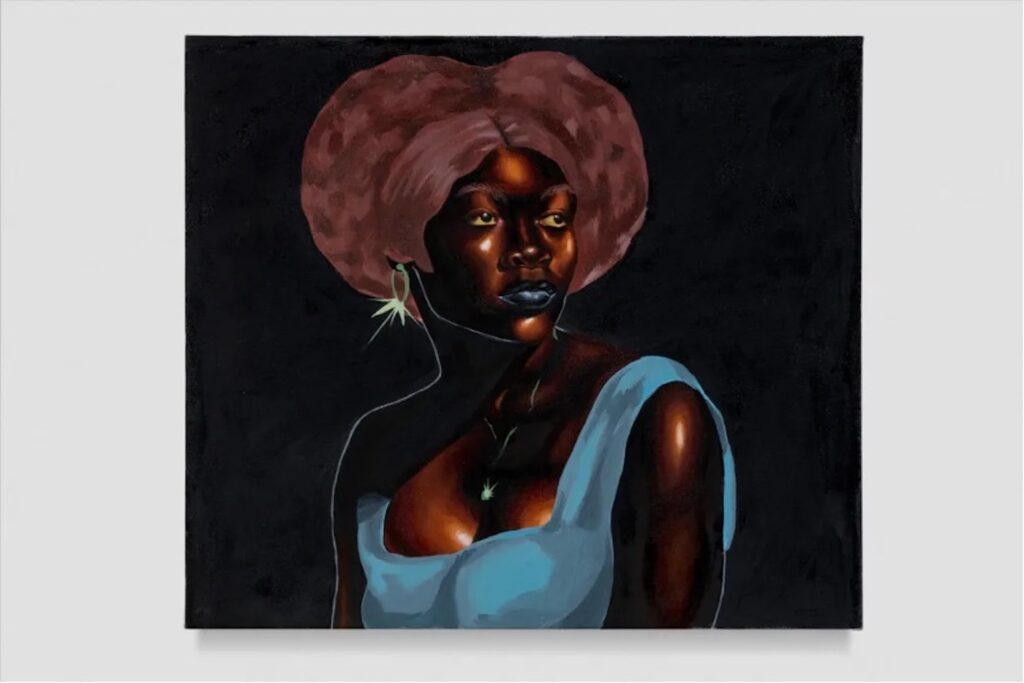

Cob is proud to present Kindness and Hospitality from a Foreigner, the debut UK solo exhibition of painting and sculpture by Texan-Nigerian artist Chinaza Agbor.
The daughter of Nigerian migrants to the United States, Agbor’s work attempts to make sense of Black female identity through the prism of her own personal experience of growing up in the American South. Above all, as she puts it, she is motivated by the cycle that runs from ‘the death of self-esteem’ to the ever-repeated process of learning to love oneself anew as a Black woman.
Kindness and Hospitality from a Foreigner includes a suite of new oil paintings featuring Agbor’s distinctive fusion of figurative and abstract elements. Solarised patterns and planes of colour intersect with luminous skin tones as Agbor explores the inner workings of Black female sexuality. Her surrealistic compositions add auratic heat around certain bodily features – particularly hair – producing psychological portraits of an identity straining between the imperatives of conformity and difference, but nevertheless joyous and assertive.
At the centre of the exhibition, these atmospherics spill out into an installation that reproduces a Texan sunset. The lurid pink and orange blaze of a Southern evening is scored by the rattle and buzz of crickets and cicadas. Yet this is a landscape that exists only in memory – these insects are now muted by climate change, the tones of the sky tempered and diffused. For Agbor, this awareness is part of a process of confronting a childhood resistant to any straightforward nostalgia, a conflicted experience in a place that has itself now changed in unnerving ways. The installation plays into a sense of ‘the South’ as a construction that rests on an unstable footing – a memory-image that, in Agbor’s case, is fractured by the experience of marginality and estrangement.
The exhibition’s sculptural works develop this idea further. A tea set clad in Afro weave fuses the idea of homemaking – an idea already gendered and racialised – with a sense of conjoined difference. Referencing the pre-eminent work of Surrealist sculpture – Meret Oppenheim’s ‘Object’ – this tea set incorporates the exhibition’s interest in how the ideas of hospitality and foreignness depend upon one another for their full meaning. A bold refiguration of the modernist canon, it confirms Agbor’s status as a young artist willing to assert her voice with clarity and verve.
Two of the works on display depict members of the artist’s family. A portrait of Agbor’s younger sister, referencing her yearbook photograph as she entered the third grade of high school dominates one of the gallery spaces. This image serves as Agbor’s personal reminder of a vulnerability of that age – a time that Agbor recalls from her own experience where personal innocence and external bigotry collided and a pivotal moment where a black female’s self-esteem is systematically broken down. Meanwhile, gallery two features a large-scale portrait of Agbor’s aunt – referencing an image taken in Nigeria and overlaid on a prayer card. Through this image, Agbor confronts an unusual and combined religious pressure presented by both her Nigerian heritage and Texan upbringing – two places where Christianity is the dominant faith.
More uniquely, the exhibition features the first of Agbor’s self-portraits in an exploration of her personal vulnerability. This image is contrasted with a large multi-figurative painting – somewhat classical in its rendering it reclaims the bathing scene through a lens of black femininity.